Ethical Issues and Decision Making Project: MCAST, Semester 1
VerifiedAdded on 2023/06/08
|7
|1983
|84
Project
AI Summary
This project explores ethical issues and decision-making, defining morality and ethics and identifying factors influencing them. It distinguishes between moral rules and principles, emphasizing the connection between moral ideas and actions. The project challenges the notion that moral actions are always ethical, providing examples to illustrate this point. It also examines ethical theories, including utilitarianism, deontology, virtue ethics, and rights-based ethics, and discusses moral relativism. The project analyzes how these theories would address scenarios such as the killing of a healthy individual to save others and stem cell research, highlighting the complexities and differences in ethical perspectives. The student provides responses to questions concerning morality, ethics and ethical theories, including relevant references to support arguments. The project is a response to an assignment brief from MCAST.
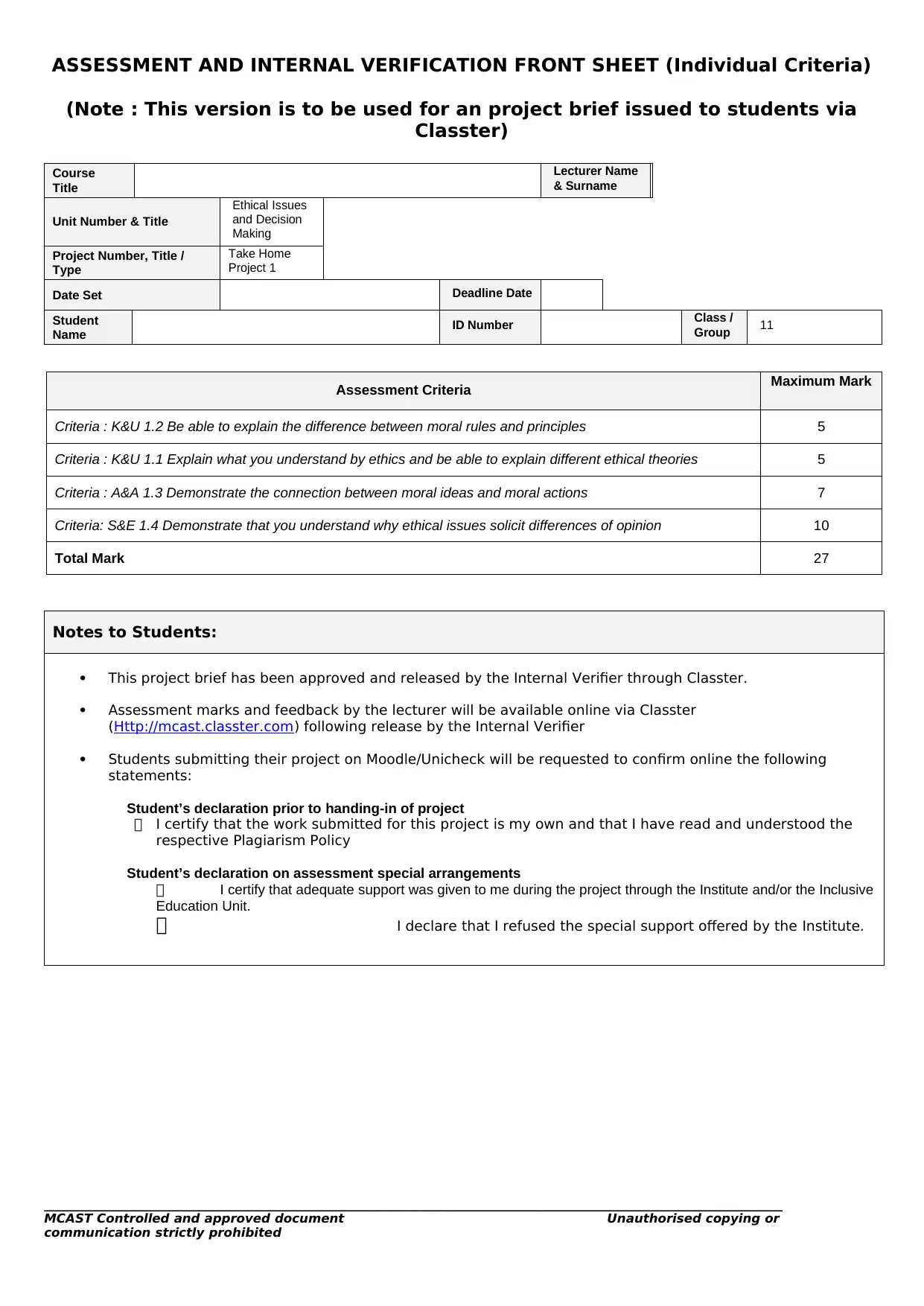
ASSESSMENT AND INTERNAL VERIFICATION FRONT SHEET (Individual Criteria)
(Note : This version is to be used for an project brief issued to students via
Classter)
Course
Title
Lecturer Name
& Surname
Unit Number & Title
Ethical Issues
and Decision
Making
Project Number, Title /
Type
Take Home
Project 1
Date Set Deadline Date
Student
Name ID Number Class /
Group 11
Assessment Criteria Maximum Mark
Criteria : K&U 1.2 Be able to explain the difference between moral rules and principles 5
Criteria : K&U 1.1 Explain what you understand by ethics and be able to explain different ethical theories 5
Criteria : A&A 1.3 Demonstrate the connection between moral ideas and moral actions 7
Criteria: S&E 1.4 Demonstrate that you understand why ethical issues solicit differences of opinion 10
Total Mark 27
Notes to Students:
This project brief has been approved and released by the Internal Verifier through Classter.
Assessment marks and feedback by the lecturer will be available online via Classter
(Http://mcast.classter.com) following release by the Internal Verifier
Students submitting their project on Moodle/Unicheck will be requested to confirm online the following
statements:
Student’s declaration prior to handing-in of project
I certify that the work submitted for this project is my own and that I have read and understood the
respective Plagiarism Policy
Student’s declaration on assessment special arrangements
I certify that adequate support was given to me during the project through the Institute and/or the Inclusive
Education Unit.
I declare that I refused the special support offered by the Institute.
_______________________________________________________________________________________________________________________
MCAST Controlled and approved document Unauthorised copying or
communication strictly prohibited
(Note : This version is to be used for an project brief issued to students via
Classter)
Course
Title
Lecturer Name
& Surname
Unit Number & Title
Ethical Issues
and Decision
Making
Project Number, Title /
Type
Take Home
Project 1
Date Set Deadline Date
Student
Name ID Number Class /
Group 11
Assessment Criteria Maximum Mark
Criteria : K&U 1.2 Be able to explain the difference between moral rules and principles 5
Criteria : K&U 1.1 Explain what you understand by ethics and be able to explain different ethical theories 5
Criteria : A&A 1.3 Demonstrate the connection between moral ideas and moral actions 7
Criteria: S&E 1.4 Demonstrate that you understand why ethical issues solicit differences of opinion 10
Total Mark 27
Notes to Students:
This project brief has been approved and released by the Internal Verifier through Classter.
Assessment marks and feedback by the lecturer will be available online via Classter
(Http://mcast.classter.com) following release by the Internal Verifier
Students submitting their project on Moodle/Unicheck will be requested to confirm online the following
statements:
Student’s declaration prior to handing-in of project
I certify that the work submitted for this project is my own and that I have read and understood the
respective Plagiarism Policy
Student’s declaration on assessment special arrangements
I certify that adequate support was given to me during the project through the Institute and/or the Inclusive
Education Unit.
I declare that I refused the special support offered by the Institute.
_______________________________________________________________________________________________________________________
MCAST Controlled and approved document Unauthorised copying or
communication strictly prohibited
Paraphrase This Document
Need a fresh take? Get an instant paraphrase of this document with our AI Paraphraser
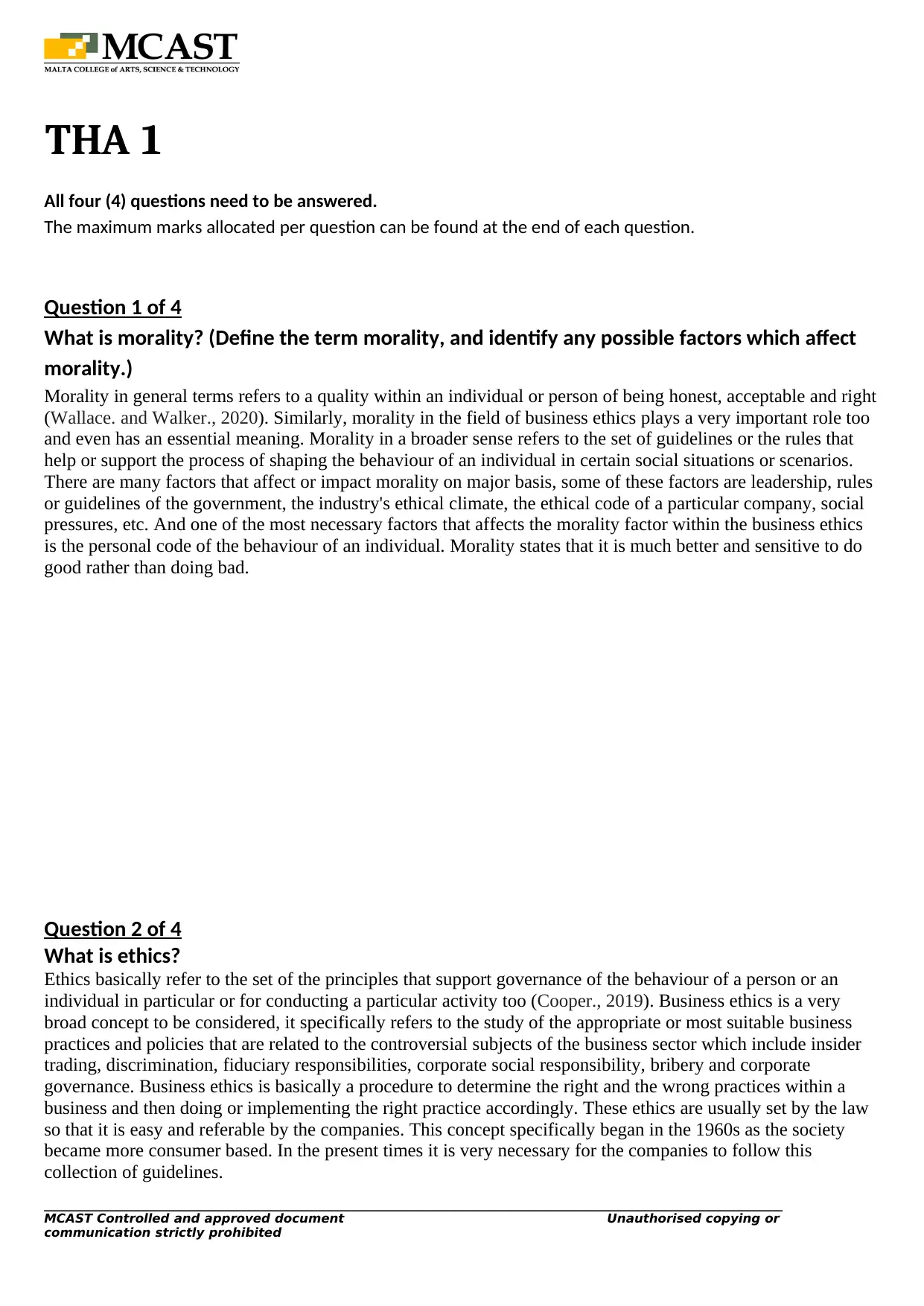
THA 1
All four (4) questions need to be answered.
The maximum marks allocated per question can be found at the end of each question.
Question 1 of 4
What is morality? (Define the term morality, and identify any possible factors which affect
morality.)
Morality in general terms refers to a quality within an individual or person of being honest, acceptable and right
(Wallace. and Walker., 2020). Similarly, morality in the field of business ethics plays a very important role too
and even has an essential meaning. Morality in a broader sense refers to the set of guidelines or the rules that
help or support the process of shaping the behaviour of an individual in certain social situations or scenarios.
There are many factors that affect or impact morality on major basis, some of these factors are leadership, rules
or guidelines of the government, the industry's ethical climate, the ethical code of a particular company, social
pressures, etc. And one of the most necessary factors that affects the morality factor within the business ethics
is the personal code of the behaviour of an individual. Morality states that it is much better and sensitive to do
good rather than doing bad.
Question 2 of 4
What is ethics?
Ethics basically refer to the set of the principles that support governance of the behaviour of a person or an
individual in particular or for conducting a particular activity too (Cooper., 2019). Business ethics is a very
broad concept to be considered, it specifically refers to the study of the appropriate or most suitable business
practices and policies that are related to the controversial subjects of the business sector which include insider
trading, discrimination, fiduciary responsibilities, corporate social responsibility, bribery and corporate
governance. Business ethics is basically a procedure to determine the right and the wrong practices within a
business and then doing or implementing the right practice accordingly. These ethics are usually set by the law
so that it is easy and referable by the companies. This concept specifically began in the 1960s as the society
became more consumer based. In the present times it is very necessary for the companies to follow this
collection of guidelines.
_______________________________________________________________________________________________________________________
MCAST Controlled and approved document Unauthorised copying or
communication strictly prohibited
All four (4) questions need to be answered.
The maximum marks allocated per question can be found at the end of each question.
Question 1 of 4
What is morality? (Define the term morality, and identify any possible factors which affect
morality.)
Morality in general terms refers to a quality within an individual or person of being honest, acceptable and right
(Wallace. and Walker., 2020). Similarly, morality in the field of business ethics plays a very important role too
and even has an essential meaning. Morality in a broader sense refers to the set of guidelines or the rules that
help or support the process of shaping the behaviour of an individual in certain social situations or scenarios.
There are many factors that affect or impact morality on major basis, some of these factors are leadership, rules
or guidelines of the government, the industry's ethical climate, the ethical code of a particular company, social
pressures, etc. And one of the most necessary factors that affects the morality factor within the business ethics
is the personal code of the behaviour of an individual. Morality states that it is much better and sensitive to do
good rather than doing bad.
Question 2 of 4
What is ethics?
Ethics basically refer to the set of the principles that support governance of the behaviour of a person or an
individual in particular or for conducting a particular activity too (Cooper., 2019). Business ethics is a very
broad concept to be considered, it specifically refers to the study of the appropriate or most suitable business
practices and policies that are related to the controversial subjects of the business sector which include insider
trading, discrimination, fiduciary responsibilities, corporate social responsibility, bribery and corporate
governance. Business ethics is basically a procedure to determine the right and the wrong practices within a
business and then doing or implementing the right practice accordingly. These ethics are usually set by the law
so that it is easy and referable by the companies. This concept specifically began in the 1960s as the society
became more consumer based. In the present times it is very necessary for the companies to follow this
collection of guidelines.
_______________________________________________________________________________________________________________________
MCAST Controlled and approved document Unauthorised copying or
communication strictly prohibited
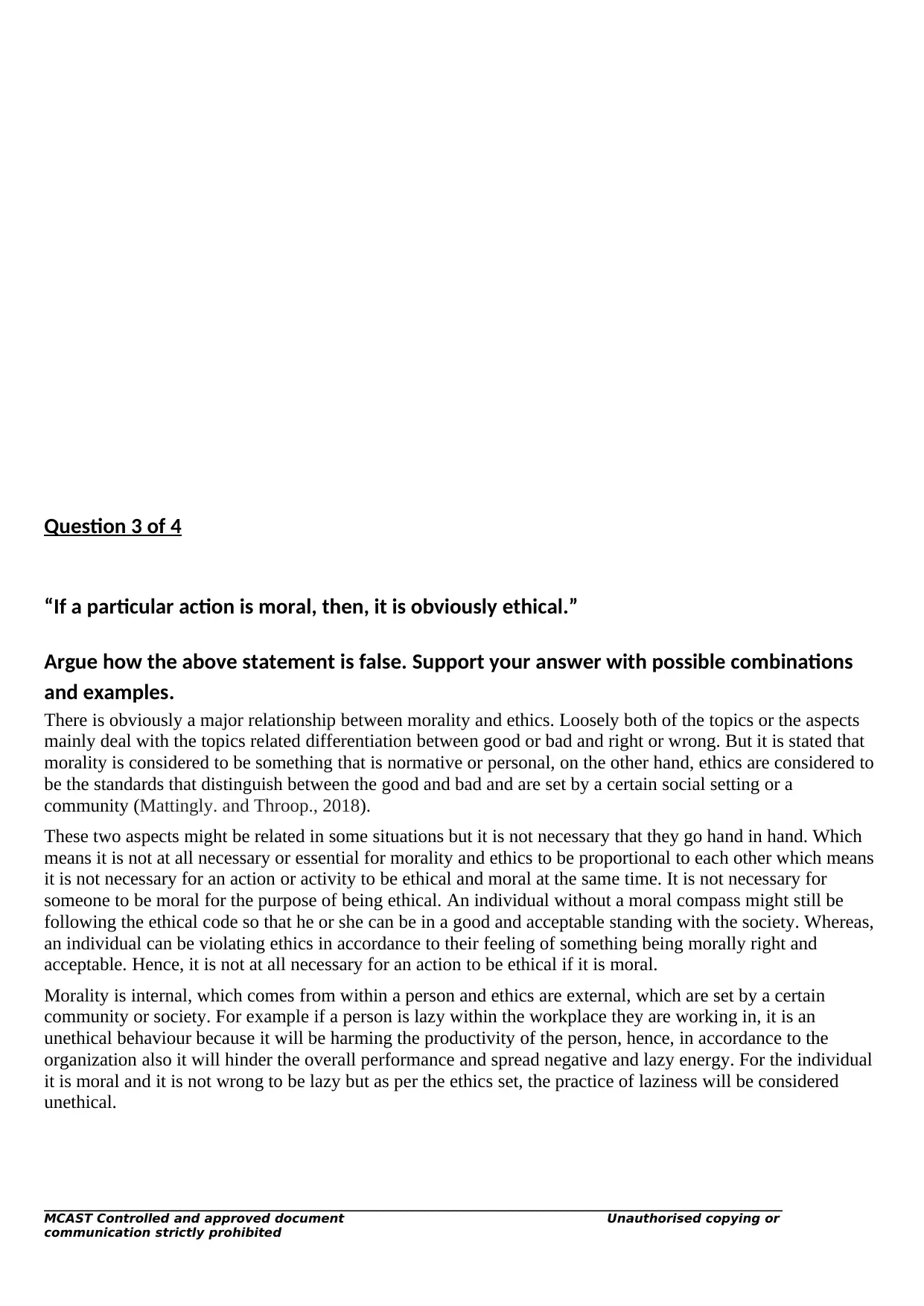
Question 3 of 4
“If a particular action is moral, then, it is obviously ethical.”
Argue how the above statement is false. Support your answer with possible combinations
and examples.
There is obviously a major relationship between morality and ethics. Loosely both of the topics or the aspects
mainly deal with the topics related differentiation between good or bad and right or wrong. But it is stated that
morality is considered to be something that is normative or personal, on the other hand, ethics are considered to
be the standards that distinguish between the good and bad and are set by a certain social setting or a
community (Mattingly. and Throop., 2018).
These two aspects might be related in some situations but it is not necessary that they go hand in hand. Which
means it is not at all necessary or essential for morality and ethics to be proportional to each other which means
it is not necessary for an action or activity to be ethical and moral at the same time. It is not necessary for
someone to be moral for the purpose of being ethical. An individual without a moral compass might still be
following the ethical code so that he or she can be in a good and acceptable standing with the society. Whereas,
an individual can be violating ethics in accordance to their feeling of something being morally right and
acceptable. Hence, it is not at all necessary for an action to be ethical if it is moral.
Morality is internal, which comes from within a person and ethics are external, which are set by a certain
community or society. For example if a person is lazy within the workplace they are working in, it is an
unethical behaviour because it will be harming the productivity of the person, hence, in accordance to the
organization also it will hinder the overall performance and spread negative and lazy energy. For the individual
it is moral and it is not wrong to be lazy but as per the ethics set, the practice of laziness will be considered
unethical.
_______________________________________________________________________________________________________________________
MCAST Controlled and approved document Unauthorised copying or
communication strictly prohibited
“If a particular action is moral, then, it is obviously ethical.”
Argue how the above statement is false. Support your answer with possible combinations
and examples.
There is obviously a major relationship between morality and ethics. Loosely both of the topics or the aspects
mainly deal with the topics related differentiation between good or bad and right or wrong. But it is stated that
morality is considered to be something that is normative or personal, on the other hand, ethics are considered to
be the standards that distinguish between the good and bad and are set by a certain social setting or a
community (Mattingly. and Throop., 2018).
These two aspects might be related in some situations but it is not necessary that they go hand in hand. Which
means it is not at all necessary or essential for morality and ethics to be proportional to each other which means
it is not necessary for an action or activity to be ethical and moral at the same time. It is not necessary for
someone to be moral for the purpose of being ethical. An individual without a moral compass might still be
following the ethical code so that he or she can be in a good and acceptable standing with the society. Whereas,
an individual can be violating ethics in accordance to their feeling of something being morally right and
acceptable. Hence, it is not at all necessary for an action to be ethical if it is moral.
Morality is internal, which comes from within a person and ethics are external, which are set by a certain
community or society. For example if a person is lazy within the workplace they are working in, it is an
unethical behaviour because it will be harming the productivity of the person, hence, in accordance to the
organization also it will hinder the overall performance and spread negative and lazy energy. For the individual
it is moral and it is not wrong to be lazy but as per the ethics set, the practice of laziness will be considered
unethical.
_______________________________________________________________________________________________________________________
MCAST Controlled and approved document Unauthorised copying or
communication strictly prohibited
⊘ This is a preview!⊘
Do you want full access?
Subscribe today to unlock all pages.

Trusted by 1+ million students worldwide
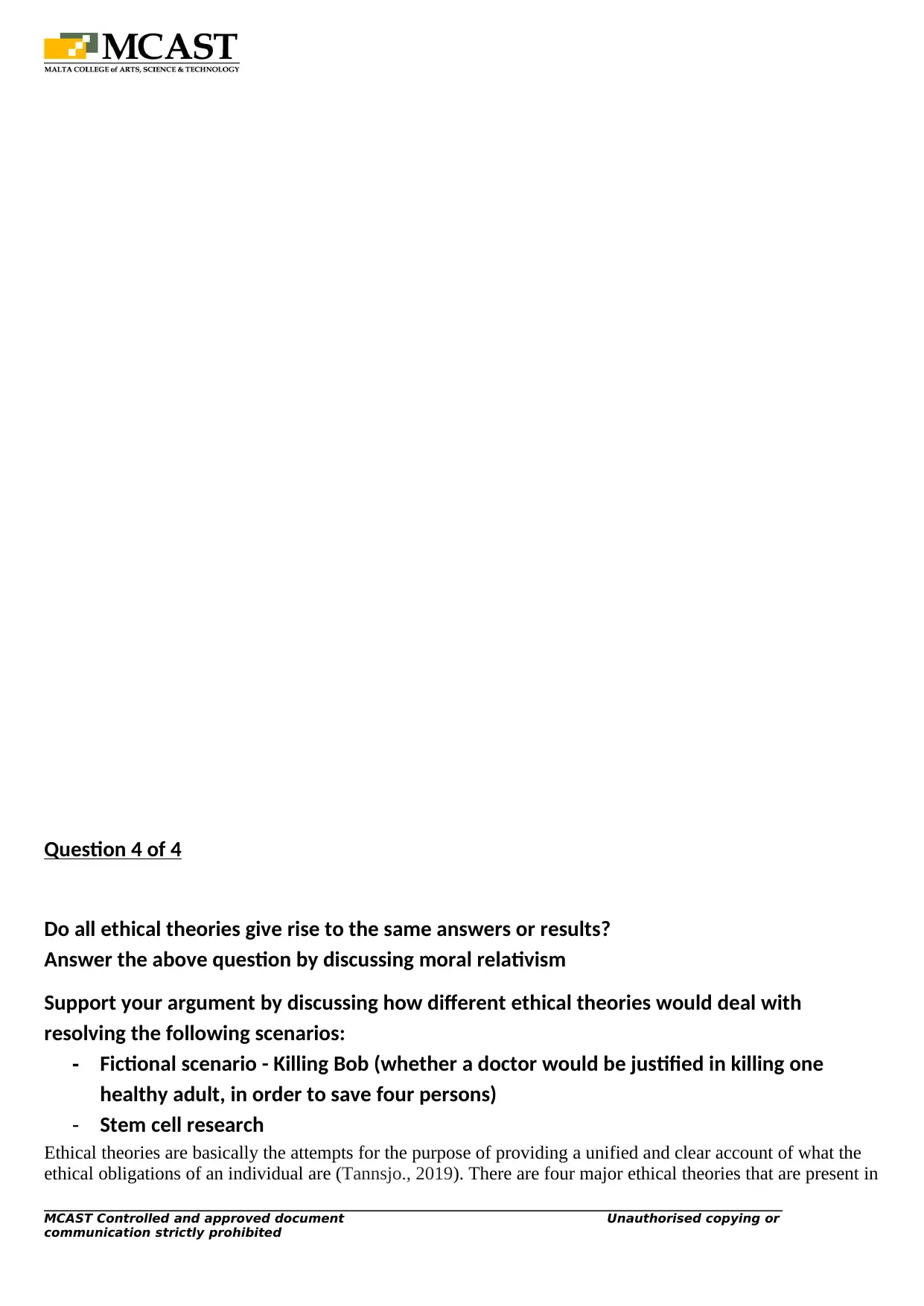
Question 4 of 4
Do all ethical theories give rise to the same answers or results?
Answer the above question by discussing moral relativism
Support your argument by discussing how different ethical theories would deal with
resolving the following scenarios:
- Fictional scenario - Killing Bob (whether a doctor would be justified in killing one
healthy adult, in order to save four persons)
- Stem cell research
Ethical theories are basically the attempts for the purpose of providing a unified and clear account of what the
ethical obligations of an individual are (Tannsjo., 2019). There are four major ethical theories that are present in
_______________________________________________________________________________________________________________________
MCAST Controlled and approved document Unauthorised copying or
communication strictly prohibited
Do all ethical theories give rise to the same answers or results?
Answer the above question by discussing moral relativism
Support your argument by discussing how different ethical theories would deal with
resolving the following scenarios:
- Fictional scenario - Killing Bob (whether a doctor would be justified in killing one
healthy adult, in order to save four persons)
- Stem cell research
Ethical theories are basically the attempts for the purpose of providing a unified and clear account of what the
ethical obligations of an individual are (Tannsjo., 2019). There are four major ethical theories that are present in
_______________________________________________________________________________________________________________________
MCAST Controlled and approved document Unauthorised copying or
communication strictly prohibited
Paraphrase This Document
Need a fresh take? Get an instant paraphrase of this document with our AI Paraphraser
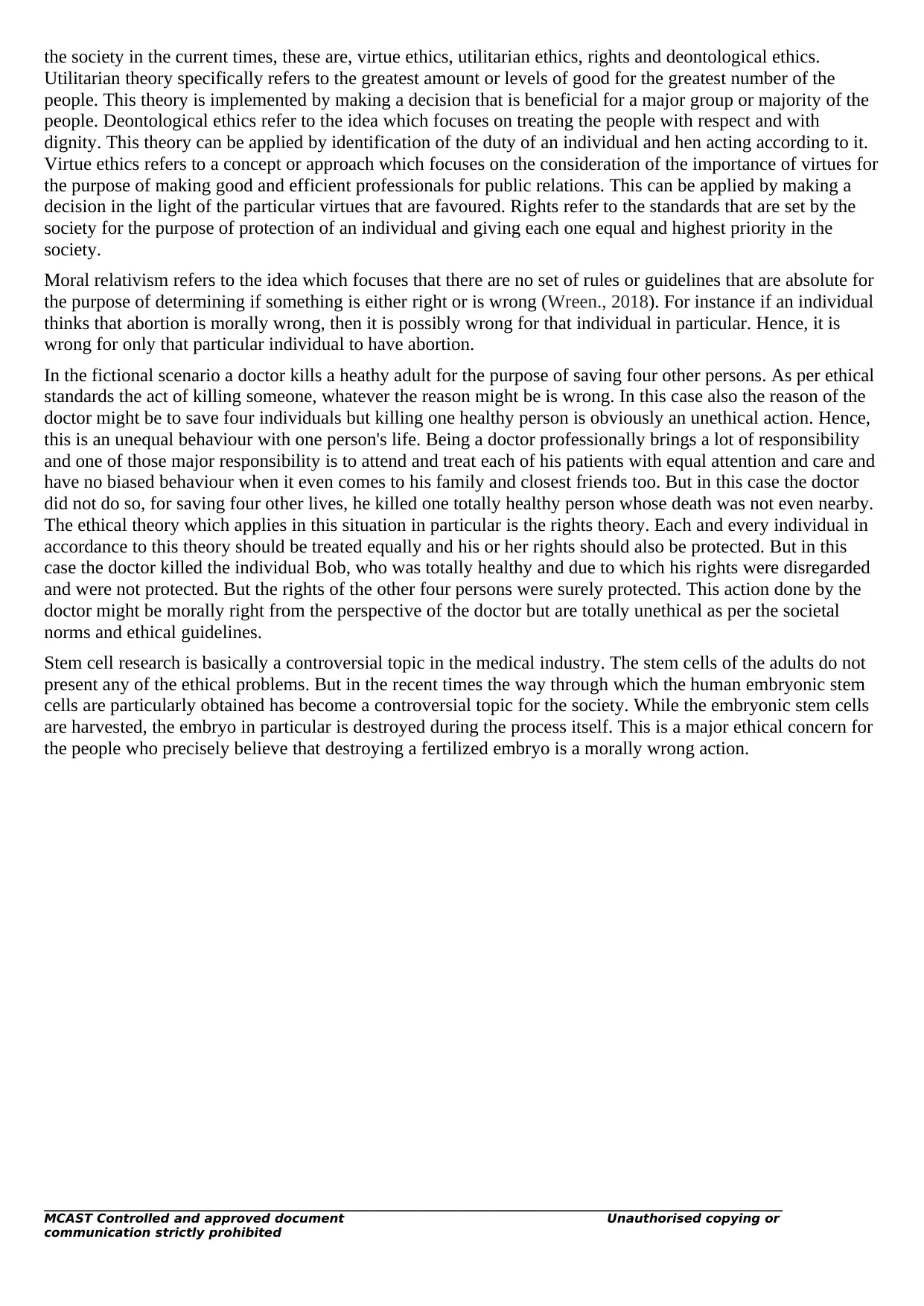
the society in the current times, these are, virtue ethics, utilitarian ethics, rights and deontological ethics.
Utilitarian theory specifically refers to the greatest amount or levels of good for the greatest number of the
people. This theory is implemented by making a decision that is beneficial for a major group or majority of the
people. Deontological ethics refer to the idea which focuses on treating the people with respect and with
dignity. This theory can be applied by identification of the duty of an individual and hen acting according to it.
Virtue ethics refers to a concept or approach which focuses on the consideration of the importance of virtues for
the purpose of making good and efficient professionals for public relations. This can be applied by making a
decision in the light of the particular virtues that are favoured. Rights refer to the standards that are set by the
society for the purpose of protection of an individual and giving each one equal and highest priority in the
society.
Moral relativism refers to the idea which focuses that there are no set of rules or guidelines that are absolute for
the purpose of determining if something is either right or is wrong (Wreen., 2018). For instance if an individual
thinks that abortion is morally wrong, then it is possibly wrong for that individual in particular. Hence, it is
wrong for only that particular individual to have abortion.
In the fictional scenario a doctor kills a heathy adult for the purpose of saving four other persons. As per ethical
standards the act of killing someone, whatever the reason might be is wrong. In this case also the reason of the
doctor might be to save four individuals but killing one healthy person is obviously an unethical action. Hence,
this is an unequal behaviour with one person's life. Being a doctor professionally brings a lot of responsibility
and one of those major responsibility is to attend and treat each of his patients with equal attention and care and
have no biased behaviour when it even comes to his family and closest friends too. But in this case the doctor
did not do so, for saving four other lives, he killed one totally healthy person whose death was not even nearby.
The ethical theory which applies in this situation in particular is the rights theory. Each and every individual in
accordance to this theory should be treated equally and his or her rights should also be protected. But in this
case the doctor killed the individual Bob, who was totally healthy and due to which his rights were disregarded
and were not protected. But the rights of the other four persons were surely protected. This action done by the
doctor might be morally right from the perspective of the doctor but are totally unethical as per the societal
norms and ethical guidelines.
Stem cell research is basically a controversial topic in the medical industry. The stem cells of the adults do not
present any of the ethical problems. But in the recent times the way through which the human embryonic stem
cells are particularly obtained has become a controversial topic for the society. While the embryonic stem cells
are harvested, the embryo in particular is destroyed during the process itself. This is a major ethical concern for
the people who precisely believe that destroying a fertilized embryo is a morally wrong action.
_______________________________________________________________________________________________________________________
MCAST Controlled and approved document Unauthorised copying or
communication strictly prohibited
Utilitarian theory specifically refers to the greatest amount or levels of good for the greatest number of the
people. This theory is implemented by making a decision that is beneficial for a major group or majority of the
people. Deontological ethics refer to the idea which focuses on treating the people with respect and with
dignity. This theory can be applied by identification of the duty of an individual and hen acting according to it.
Virtue ethics refers to a concept or approach which focuses on the consideration of the importance of virtues for
the purpose of making good and efficient professionals for public relations. This can be applied by making a
decision in the light of the particular virtues that are favoured. Rights refer to the standards that are set by the
society for the purpose of protection of an individual and giving each one equal and highest priority in the
society.
Moral relativism refers to the idea which focuses that there are no set of rules or guidelines that are absolute for
the purpose of determining if something is either right or is wrong (Wreen., 2018). For instance if an individual
thinks that abortion is morally wrong, then it is possibly wrong for that individual in particular. Hence, it is
wrong for only that particular individual to have abortion.
In the fictional scenario a doctor kills a heathy adult for the purpose of saving four other persons. As per ethical
standards the act of killing someone, whatever the reason might be is wrong. In this case also the reason of the
doctor might be to save four individuals but killing one healthy person is obviously an unethical action. Hence,
this is an unequal behaviour with one person's life. Being a doctor professionally brings a lot of responsibility
and one of those major responsibility is to attend and treat each of his patients with equal attention and care and
have no biased behaviour when it even comes to his family and closest friends too. But in this case the doctor
did not do so, for saving four other lives, he killed one totally healthy person whose death was not even nearby.
The ethical theory which applies in this situation in particular is the rights theory. Each and every individual in
accordance to this theory should be treated equally and his or her rights should also be protected. But in this
case the doctor killed the individual Bob, who was totally healthy and due to which his rights were disregarded
and were not protected. But the rights of the other four persons were surely protected. This action done by the
doctor might be morally right from the perspective of the doctor but are totally unethical as per the societal
norms and ethical guidelines.
Stem cell research is basically a controversial topic in the medical industry. The stem cells of the adults do not
present any of the ethical problems. But in the recent times the way through which the human embryonic stem
cells are particularly obtained has become a controversial topic for the society. While the embryonic stem cells
are harvested, the embryo in particular is destroyed during the process itself. This is a major ethical concern for
the people who precisely believe that destroying a fertilized embryo is a morally wrong action.
_______________________________________________________________________________________________________________________
MCAST Controlled and approved document Unauthorised copying or
communication strictly prohibited
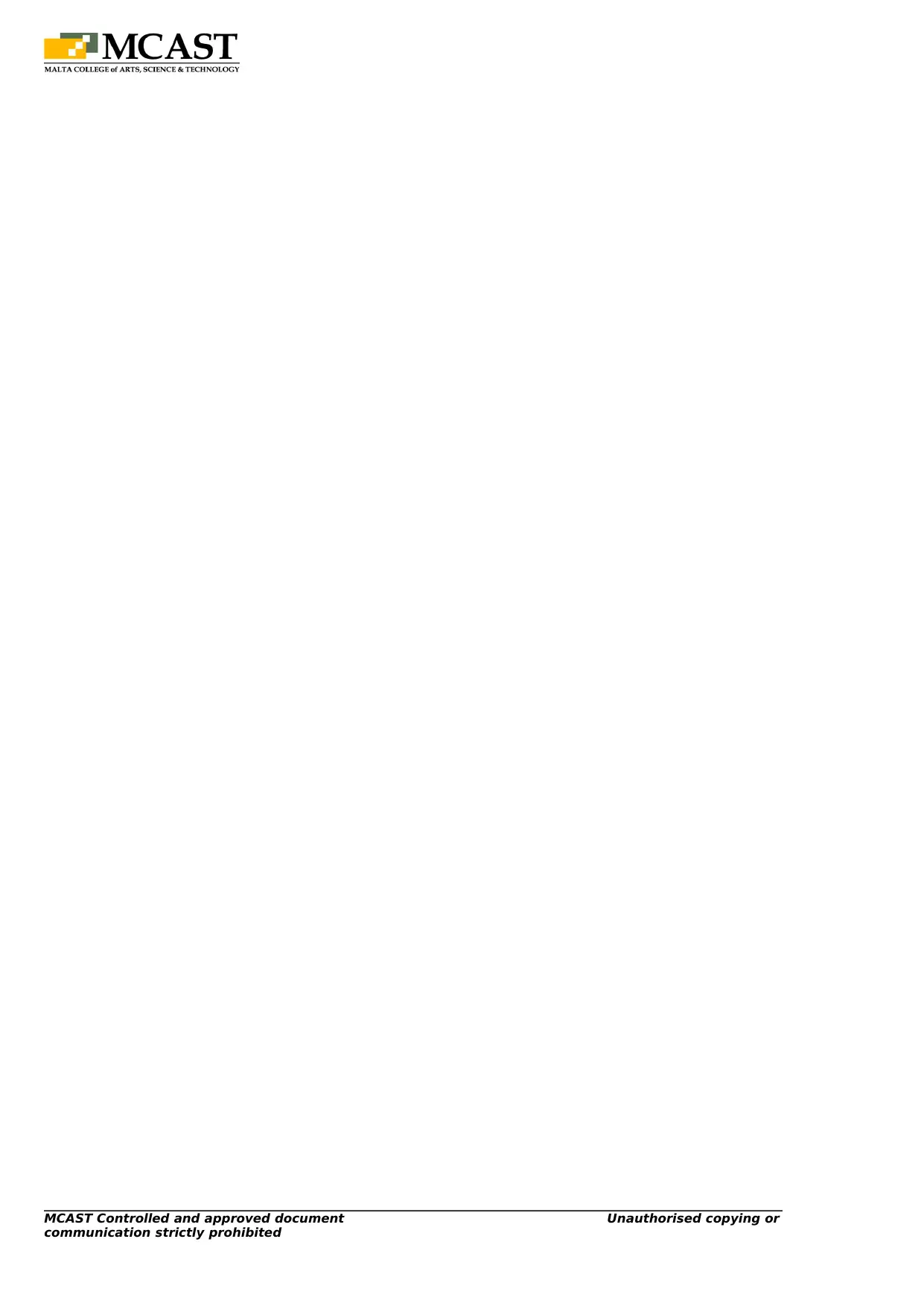
_______________________________________________________________________________________________________________________
MCAST Controlled and approved document Unauthorised copying or
communication strictly prohibited
MCAST Controlled and approved document Unauthorised copying or
communication strictly prohibited
⊘ This is a preview!⊘
Do you want full access?
Subscribe today to unlock all pages.

Trusted by 1+ million students worldwide
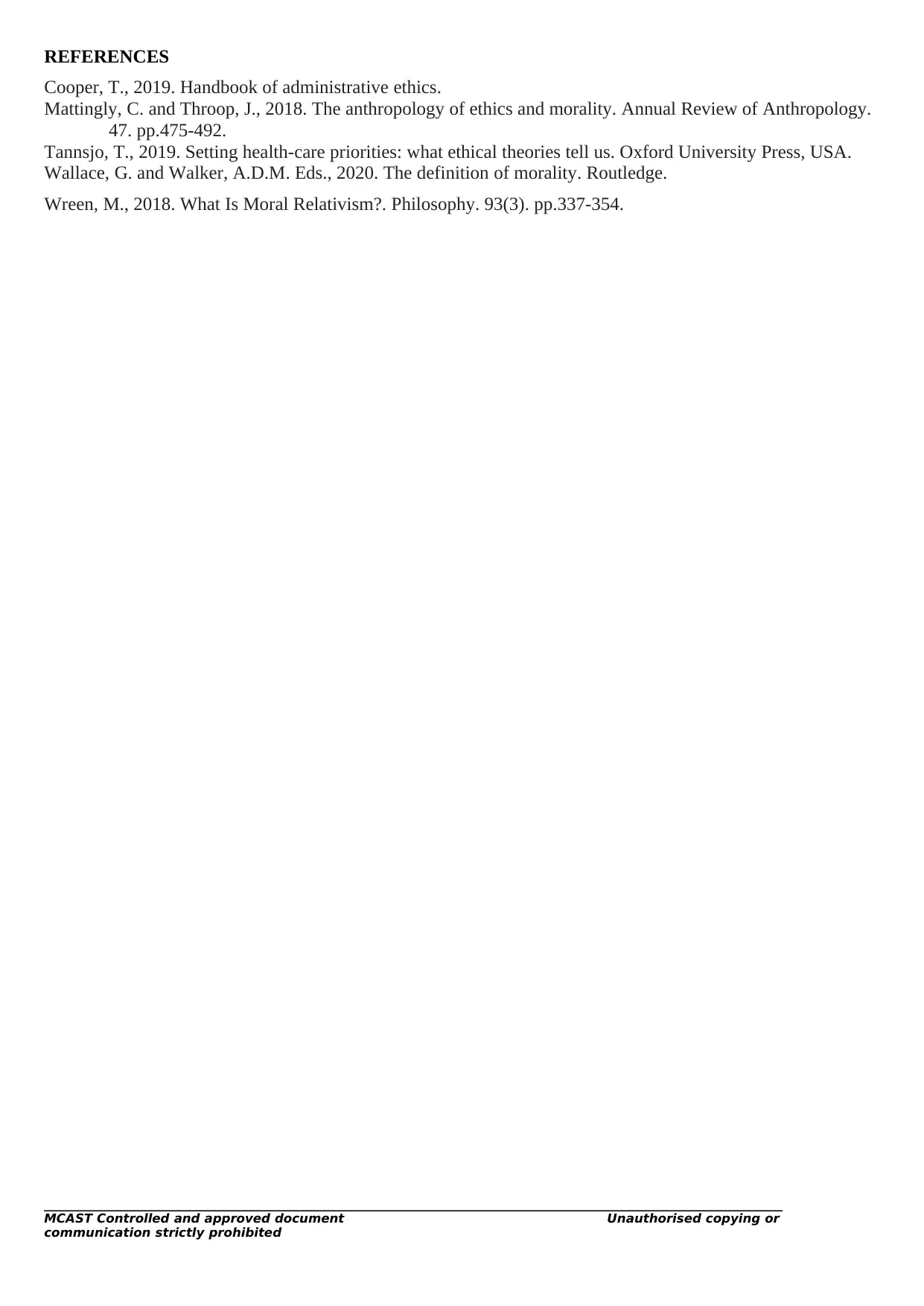
REFERENCES
Cooper, T., 2019. Handbook of administrative ethics.
Mattingly, C. and Throop, J., 2018. The anthropology of ethics and morality. Annual Review of Anthropology.
47. pp.475-492.
Tannsjo, T., 2019. Setting health-care priorities: what ethical theories tell us. Oxford University Press, USA.
Wallace, G. and Walker, A.D.M. Eds., 2020. The definition of morality. Routledge.
Wreen, M., 2018. What Is Moral Relativism?. Philosophy. 93(3). pp.337-354.
_______________________________________________________________________________________________________________________
MCAST Controlled and approved document Unauthorised copying or
communication strictly prohibited
Cooper, T., 2019. Handbook of administrative ethics.
Mattingly, C. and Throop, J., 2018. The anthropology of ethics and morality. Annual Review of Anthropology.
47. pp.475-492.
Tannsjo, T., 2019. Setting health-care priorities: what ethical theories tell us. Oxford University Press, USA.
Wallace, G. and Walker, A.D.M. Eds., 2020. The definition of morality. Routledge.
Wreen, M., 2018. What Is Moral Relativism?. Philosophy. 93(3). pp.337-354.
_______________________________________________________________________________________________________________________
MCAST Controlled and approved document Unauthorised copying or
communication strictly prohibited
1 out of 7
Related Documents
Your All-in-One AI-Powered Toolkit for Academic Success.
+13062052269
info@desklib.com
Available 24*7 on WhatsApp / Email
![[object Object]](/_next/static/media/star-bottom.7253800d.svg)
Unlock your academic potential
Copyright © 2020–2026 A2Z Services. All Rights Reserved. Developed and managed by ZUCOL.





